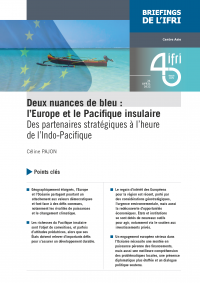Credits: Shutterstock
This content was originally published on the IFRI website.
Two Shades of Blue: Europe and the Pacific Islands, strategic partners in the Indo-Pacific era
In recent years, France and the European Union (EU) have published their respective Indo-Pacific strategies and a Ministerial Forum was held in Paris on February 22, 2022 bringing together over 60 foreign affairs ministers from European and Pacific Island countries.
France and the EU are re-engaging in this strategic region, which is an economic and political centre of gravity whose stability is threatened by transnational risks (climate change, epidemics, pressure on natural resources) and by inter-state tensions exacerbated by US-China rivalry.
However, the area spanning the 22 member countries and territories of the Pacific Community (SPC) has received less attention and can even be described as a blind spot in these Indo-Pacific discussions. Yet, although they have a population of only 13 million, these Pacific Island states and territories have a combined Exclusive Economic Zone (EEZ) of almost 40 million square kilometres (km2) and are strategically located close to East Asia. These territories and their natural resources have attracted and still attract keen interest and sometimes very violent competition between powers. Today, the Pacific Islands are on the front line of the global existential challenges of climate change, biodiversity protection and sustainable development, but also geostrategic rivalries.
Due to the geographical distance and Europe's still limited knowledge of this region, political, economic and media interest is often lacking. For this reason, Ifri and the SPC have decided to organise a research programme on the strategic importance of the Pacific Islands.
This Briefing is based on discussions that took place at the programme’s opening conference on 10 March 2022; contributions from panellists will therefore be highlighted.
This report provides an overview of current regional issues in the Pacific Islands and argues for greater European engagement in the region. This rapprochement is justified firstly because European and Pacific Island countries share similar values and face similar challenges, and secondly because new European interest and facilities make Europe a partner of choice to support sustainable development in the Pacific Islands. Since this engagement will come with various challenges, recommendations for European decision-makers are outlined in the conclusions.
France and the EU are re-engaging in this strategic region, which is an economic and political centre of gravity whose stability is threatened by transnational risks (climate change, epidemics, pressure on natural resources) and by inter-state tensions exacerbated by US-China rivalry.
However, the area spanning the 22 member countries and territories of the Pacific Community (SPC) has received less attention and can even be described as a blind spot in these Indo-Pacific discussions. Yet, although they have a population of only 13 million, these Pacific Island states and territories have a combined Exclusive Economic Zone (EEZ) of almost 40 million square kilometres (km2) and are strategically located close to East Asia. These territories and their natural resources have attracted and still attract keen interest and sometimes very violent competition between powers. Today, the Pacific Islands are on the front line of the global existential challenges of climate change, biodiversity protection and sustainable development, but also geostrategic rivalries.
Due to the geographical distance and Europe's still limited knowledge of this region, political, economic and media interest is often lacking. For this reason, Ifri and the SPC have decided to organise a research programme on the strategic importance of the Pacific Islands.
This Briefing is based on discussions that took place at the programme’s opening conference on 10 March 2022; contributions from panellists will therefore be highlighted.
This report provides an overview of current regional issues in the Pacific Islands and argues for greater European engagement in the region. This rapprochement is justified firstly because European and Pacific Island countries share similar values and face similar challenges, and secondly because new European interest and facilities make Europe a partner of choice to support sustainable development in the Pacific Islands. Since this engagement will come with various challenges, recommendations for European decision-makers are outlined in the conclusions.
***
The topics discussed at this opening conference will be further addressed in three upcoming webinars and publications, which will focus on oceans in June, global warming in September and food security in November.
This Briefing was supported by the Pacific Community (SPC).

